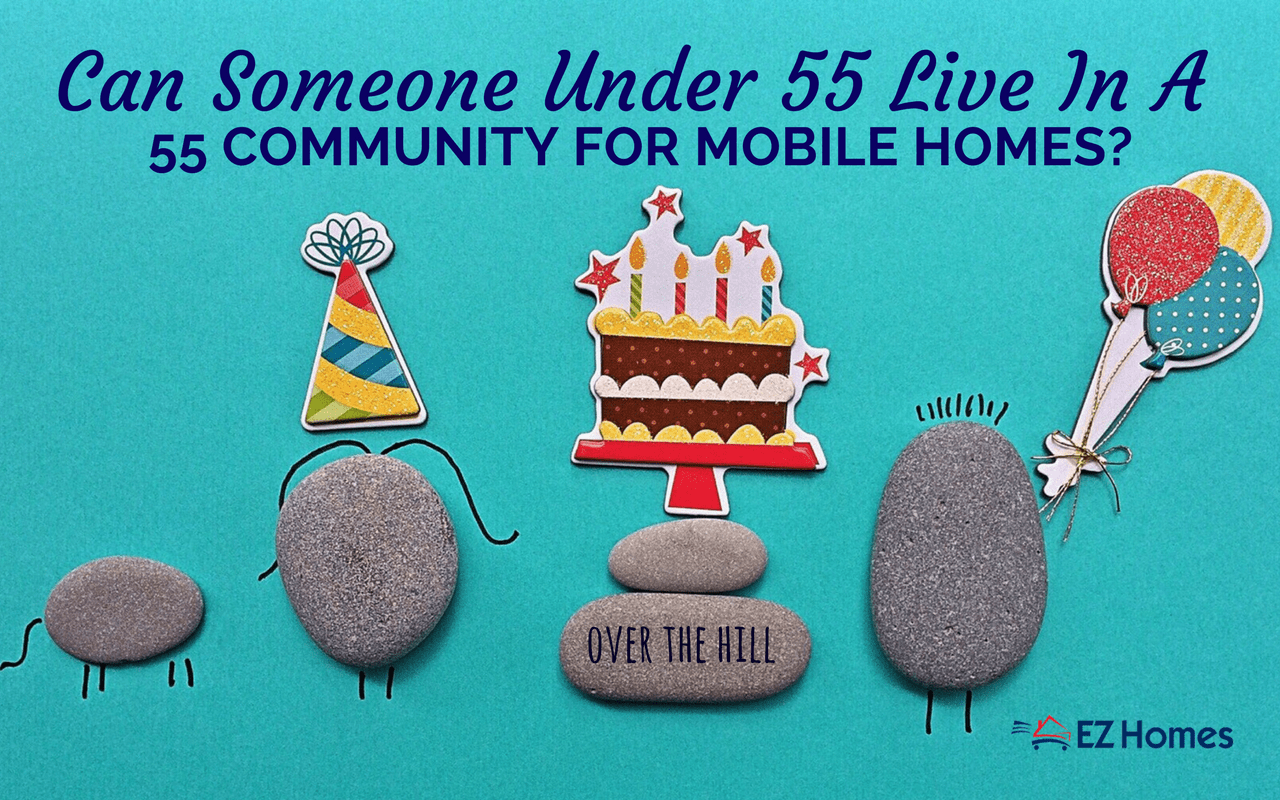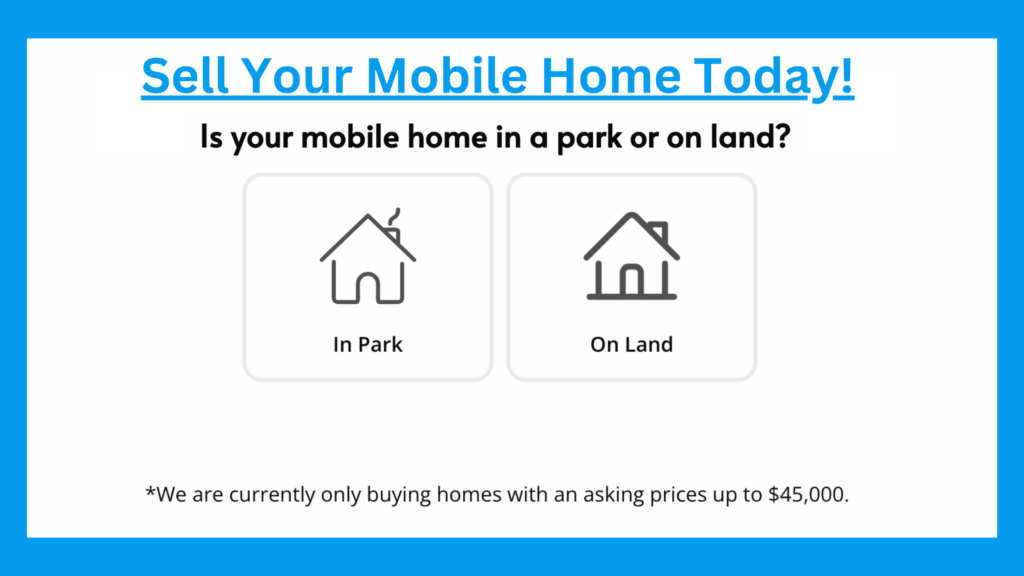For various reasons, mobile home parks have become a popular option for those who are soon to be, or already, retired. For those of you who have heard of the Fair Housing Act, it might seem strange that a park would be able to discriminate on tenants based on age. You might have also seen cases where younger people live in parks meant as age 55+ communities. This leads to the question, “can someone under 55 live in a 55 community?”

In this article, we will answer that question and look at why these parks are popular and what exceptions there are to their age restrictions.
Why are 55+ mobile home communities so popular?
Mobile home communities are ideally suited to retirees (or people approaching that stage) for a number of reasons. Most of these also benefit others. However, they are most often experienced and desired by people of this age group.
Mobile homes are cost-effective
As you approach retirement age, you need to plan your future from a financial perspective. Currently, the U.S. is facing a retirement crisis. Many people (especially baby boomers), who are retiring soon, have not saved up close to the recommended amount, about $1,000,000. You get this figure if you take the average retirement age (63) and plan to withdraw $5,000 every month to live on for 30 years.
The average amount you can expect to collect from Social Security is only around $1,200 which is not to live off by itself. It’s shocking to realize that around 36% of Americans over the age of 65 are completely dependant on this amount.
You have no idea how long you might live and be dependant on your retirement savings and social security. This means retirees must be money-conscious.
Mobile homes are very affordable on almost every front. Communities even more so. For one, even if you plan to buy a home and move it to a community, the home should only cost around $20,000 (for smaller single-wides) to $70,000 (for larger double-wides). If you are still a few years off from retirement, you have a pretty good chance of paying off the home before retirement comes knocking.
If you own the home, you will only pay lot rent to stay within the community which typically amounts to $200-$300 per month.
You can also lease a home from a mobile home community and the total rental should be less than $1,000. This is significantly lower than the average apartment rent of $1,300.
Lifestyle
Mobile home communities seem to offer the perfect blend of lifestyle options for people above 55 and who are soon looking towards enjoying retirement. We already mentioned that mobile home rent is much cheaper than apartment rent. And for this price, you have a free-standing home, a lot of your own, and a real community.
Living in a house of your own is preferable for empty-nesters and retirees. When you reach your golden years, you want to be able to kick back and relax in the peace and quiet of your own home. This allows you to live out the rest of your days with a sense of pride and dignity.

Mobile home park communities are usually outside of the hustle and bustle of the city. Most are located just outside city limits or on their fringes. This contributes to the sense of peace and serenity for the residents. It’s unlikely you will be woken up in the middle of the night by honking or racing cars.
Most mobile home parks also have a distinctly “outdoorsy” feel and many crave this proximity to nature.
Lastly, the sense of community is a huge draw. People want to be able to walk safely at all times, greet their friendly neighbors, and feel safe and secure in the knowledge that they are living among similar people.
Facilities
Mobile home parks aimed at residents that are 55 or older tend to have facilities or amenities attractive to this age group. If you look at retirement communities, you will find that a lot of them have on-site or access to fishing, golfing, a club area, and other hobbies. Many offer social programs such as bingo nights and other recreational activities to keep the community spirit going.
Most mobile home parks for older residents provide basic services that become physically challenging to do with age. This includes things like home maintenance, landscaping, gardening services, and basic repair work. In most cases, residents are free to do their own gardening if they wish. Tough jobs like mowing the lawn are usually covered.
Unfortunately, it’s rare for mobile home communities like this to offer special on-site medical care or treatment. If you need Alzheimer’s or Memory Care, Assisted Living or Continuing Care, you might need to look at more specialized options.
Mobile home parks are made up of independent residences spread over a park and thus already assume some level of independence and autonomy from their tenants. Communities that offer specialized services are in apartment-like blocks with much more control over tenants’ comings and goings.
However, most parks should at least have easy access to medical services. Additionally, they may offer programs for people who need less-intensive care.
Can you live in an age 55+ community if you are below that age?
Fair Housing Act 1968
The first place one should always turn to for answers regarding what you can and can’t do is the law. You might have heard of the Fair Housing Act 1968 which is meant to prevent landlords from discriminating against potential tenants. So, you might be wondering whether this isn’t a form of discrimination as well.
The Fair Housing Act 1968 lists the following as illegal means of discrimination:
- Race
- Color
- Gender
- National Origin
- Religion
- Familial Status
- Disability
As you can see, age is not one of the factors that the Fair Housing Act considers as discriminatory when accepting or rejecting potential tenants. Rejecting someone based on one of the characteristics we listed could get you in big trouble, but age is not one of them.
This effectively means that landlords or management of residential properties can set whatever age limits they choose and disqualify tenants based on these limits.
Housing for Older Persons Act 1995
Another piece of legislation to reference is the Housing for Older Persons Act 1995 (HOPA). This act sets the conditions under which a mobile home park (or any other residential development) are allowed to classify themselves as a 55+ age community and refuse entry for tenants under this age.
So, if:
- All the residents of the park are above the age of 62, or
- At least 80% of residences within the park has one inhabitant that is older than 55 and shows intent to provide housing for older residents.
Then they are free to set their own age restrictions without any fear of legal challenges.
The law allows for this type of discrimination because the needs of elderly people can be very different from younger people. A park like this may have special care facilities catering for people of this age. As we mentioned before, people in this age group (and especially retirees) prefer a peaceful and quiet community which could be threatened if there are too many younger people around.
What if members of my family are below the 55 age requirement?

Not all members of a family are of the same age. This might cause you to worry whether you will be allowed in a park along with your spouse or children should they be below the requirement while you are above it. Americans still have strong family values. Being able to live together as a family is usually not up for debate.
Luckily, when it comes to this, the law agrees. If you look at the list of discriminatory factors above, you will see that familial status is listed there. That means that you can’t be refused tenancy based on your marital status or the fact that you have children.
However…
If a community meets the HOPA requirements, they are allowed to set some of their own boundaries. For example, a park might require the age of a spouse to be above a certain age. Or they might state that a certain percentage of residents within the home be above 55. They might also place a minimum age on your children.
It can get a little grey here between what a park is allowed to use to discriminate against potential tenants and what protection the law provides. If you suspect that a park is discriminating against you or your family, it can be hard to conclude whether this is fair or not because you do not know the makeup of the park itself.
It’s rare that parks of this kind allow children below 18 years of age to live there full-time. This can be a bit of a problem if you are above 55 and have young children. Parks are also reluctant to make exceptions as they will need to answer to the rest of the community if the residents aren’t happy.
Furthermore, parks can place limits on how long someone outside of their age restrictions is allowed to live with residents inside the park. For example, if your grandchildren come to visit, the park is allowed to place a limit of 2-days or a week on their stay.
What happens if the only family member above 55 passes away?
Unfortunately, you might not be able to rely on the law to help you out in this case. Most parks will let you stay for the remaining duration of your lease agreement or give you a reasonable period to mourn and move past the loss.
After that, you will most likely need to make other housing arrangements. Luckily, there are still plenty of mobile home parks that are age-appropriate for anyone with any type of family.
Are there any exceptions to allow for younger residents?
Some parks set aside lots that are available to younger residents. This measure can ensure high occupancy of the park and maximize income or just for some diversity.
The larger part of the community will usually be governed by HOPA restrictions while a much smaller part is exempt from it. It’s pretty rare to find parks that operate the other way around. As we mentioned before, these types of communities aren’t keen on making exceptions as it may upset other tenants.
Are there alternatives?
Yes. Technically, as long as they adhere to the HOPA guidelines we have laid out, parks can open with almost any age limits of their choosing. 55 is by far the most popular category and has become a blanket term used for retirement communities. Some parks will be listed as 55+ years but when you go look at the park rules, they have other or additional age requirements.
For the most part, you should be able to live within the park as long as one member of your family is above 55, you don’t have any very young children, and your spouse isn’t below 40 years of age.
The second largest group is 62+ parks. As they are even narrower in their inclusiveness, these parks may offer slightly more specialized services than lower age parks.
For all age-specific parks, you’ll need to carefully consider your familial status as well as the park’s rules and guidelines. Some states might have slightly different requirements or guidelines to take into account as well.
Enjoy the retirement life in a mobile home community
A mobile home park is a fantastic option for anyone approaching their golden years and who want to spend it in peace and in a community environment. Although the age requirements may seem punitive, it’s really for the good of everyone living in the park. So, we hope we have given you a thorough answer to the question “can someone under 55 live in a 55 community?” and put your mind at ease.



